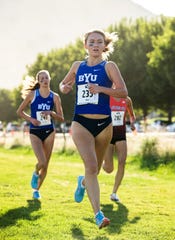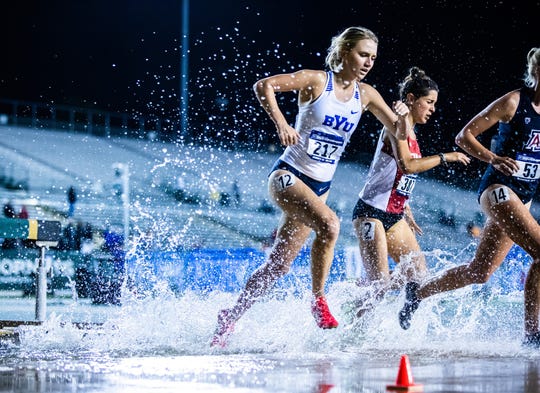For Emma Gee, being the only out LGBTQ athlete at BYU is complicated
Emma Gee sits casually at a restaurant in Provo, Utah, and stares into her date’s eyes. Holding hands and kissing are off-limits.
Be careful, she thinks to herself, “You don’t want to break the honor code.”
Gee is one of the most recognizable athletes at Brigham Young University, and any public display of affection would draw attention since her date is a woman.
The school's honor code forbids “homosexual behavior” – just like it does any kind of premarital sex – and The Church of Jesus Christ of Latter-day Saints treats same-sex attraction as the urge to sin. Violations include “not only sexual relations between members of the same sex, but all forms of physical intimacy that give expression to homosexual feelings.”
BYU runner Emma Gee has competed on the Cougars cross-country team since 2015 and still has one year of eligibility left in the outdoor track season. (Photo: Courtesy of BYU (Gabriel Mayberry))
The fifth-year senior track and cross-country runner became the first Division I athlete in the Mormon institution’s 143-year history to be publicly out when she told her team and administrators she was bisexual last year. The honor code states, "one's stated same-gender attraction is not an issue."
Yet Gee says she knows of other LGBTQ athletes at BYU who have stayed closeted to avoid abuse or even expulsion. She was the same way until deciding to go public, even if that meant doing it at one of the hardest places in America to be gay.
“Everyone deserves to look and say someone is like them and feel a sense of normalcy,” Gee tells USA TODAY Sports. “I looked for that, just for one person, for a long time. When I couldn’t find that, I said, ‘Why not me?’ ”
Except being the face of a community on a campus that doesn’t have one comes at a cost. Last fall, in a required annual meeting with the bishop overseeing her ward, she experienced what she called a “traumatizing” example of homophobia that mirrors countless honor code horror stories shared publicly on social media.
“I knew the bishop as a wonderful guy, and he had seen one of my posts on social media about coming out,” Gee says. “He said, ‘I just want to let you know that God loves you so much. He would love you even if you robbed a bank or murdered someone.’ He compared my sexuality to someone committing murder. He was trying to be accepting, but that’s the type of backhanded acceptance that makes me feel small and unsafe.”
Gee competes in her main event, the 3,000-meter steeplechase. She's looking to improve on her personal-best time of 10:04 in the 2020 outdoor season. (Photo: Photo: Courtesy of BYU (Nate Edwards))
The same bishop, who Gee requested not be named for this story out of fear of retribution, also offered cutting advice to the 21-year-old: “If I were you, I’d try both before you decide,” he told her in reference to her bisexuality.
“I’m not trying to be the victim, I did choose to come to BYU,” Gee says. “But that type of attacking language … there’s no part of the (Mormon) doctrine where that is OK. My relationship with God is fine, but how is that supposed to affect my relationship with the church and this campus?”
In response to Gee’s account, BYU spokesperson Carri Jenkins deferred to the LDS Church, which owns the university, citing “ecclesiastical matters.” The LDS Church did not return direct messages from USA TODAY Sports, but its website includes a subsection, “Mormon and Gay,” which states in part, “there is no change in the Church’s position of what is morally right. But what is changing is helping Church members respond sensitively.”
A culture of paranoia, subculture of safety
Gee says she feels as though she's under a microscope. If she slaps a teammate on the butt or runs around campus in her sports bra, it could be interpreted as breaking the honor code. Her teammates, coaches and fellow students are obliged to report behavior that could be a violation. If an individual is reported, they are investigated by a committee and university bishops help determine punishment, which ranges from more chapel time to expulsion.
“Because Emma’s out, she absolutely has to be more conscientious of what she does,” says BYU teammate Lauren Ellsworth.
Ellsworth and Gee often room together on road trips. “People could misconstrue my relationship with Emma as being more than a friendship because we’re a very touchy team as is,” Ellsworth says. “But that’s just ignorance of not knowing that individual.”
That’s why Gee was strategic with her coming out.
“I met with all the necessary parties (at the school). I wanted them to know me first because homophobia and stigma (are rooted) in fear of the (unknown)," Gee says. "I had to be very careful with my words, explaining: ‘I’ve dated – both boys and girls. But we’re not having sex or kissing.’”
Gee came out to senior associate athletic director Liz Darger in the spring of 2018, her family last June, her teammates in August and then went public in the fall.
BYU's Emma Gee, left, stands by as coach Diljeet Taylor congratulates a teammate. (Photo: Photo courtesy of Emma Gee)
"She brought it up in the course of the conversation," says Darger. "I thanked her for trusting me enough to share something so personal. I expressed how much I care about her and asked how I could support her."
The support was already in place. Thanks to the culture of her cross-country and track teams, Gee says she felt safest to come out and being herself at BYU – more than to her own family.
“I thought it would suck and it did. But it was worth it," Gee says. "Coach (Diljeet Taylor) taught me that in order to be my best self – as a runner and as a person – I have to be myself.”
Since coming out, Gee says she’ll get blunt questions from students like, “Do you like girls more than boys?” She hasn’t been reported, bullied or harassed so much as she’s felt the scorn of individuals who must abide by the honor code.
“Religious culture,” Gee says, “permeates how you see the world. The honor code isn’t just a rulebook. It affects every aspect of your experience. It doesn't deliberately hurt anyone, but it can cause you to look down on others.”
Emma Gee, left, comforts a BYU teammate after a grueling race. (Photo: Courtesy of Emma Gee)
Ellsworth is aware of individuals who’ve expressed contempt towards Gee.
“To those people I say: Jesus never condemned anyone,” Ellsworth says. “If Emma did get reported by someone like that, I know every (teammate) would have her back (in an honor code hearing). We’d protect her.”
Gee says she realizes others on campus don’t have protection.
“For someone who is closeted, it creates a really unhealthy paranoia,” says Gee, who’s counseled students hiding their sexual orientation. “I don’t think BYU as a whole has seriously considered how damaging isolated feelings – that their culture creates – can be. Many students have died because of suicide as a result.”
Efficacy vs. lip service
Ellsworth says Gee was “closed off to pretty much everyone” when she was closeted.
“She’s a completely different person now,” Ellsworth says, “our team as a whole was strengthened because she came out."
When Gee came out to her parents, Stephen and Erin, she erupted into anger at their response citing the Mormon emphasis on husband and wife. In her personal life, she struggles with the urgency of a temple marriage when she feels timid to go on a single date.
Clarity comes with her purpose at BYU.
Emma Gee, left, poses with BYU associate AD Liz Darger, who is leading the school's charge towards more inclusion to the LGBT community. (Photo: Courtesy of Emma Gee)
“I was raised to take accountability for the environment around me, through social efficacy,” she says.
Gee's at the forefront of BYU’s effort in improving her campus environment. Adds Ellsworth: "She speaks up for the voiceless and educates if someone is saying something hurtful. She’s changed the entire culture on campus.”
Last fall, Gee was involved in discussions between religious leaders and LGBTQ advocates when BYU hosted the NCAA’s annual Common Ground “Think Tank.” Such an event had never occurred on campus, but the university has fought to reshape its image.
"The idea that college athletics could bring together groups of people that are often seen as being at odds," Darger says, "was appealing to us."
But Gee has yet to see real change at BYU. The LGBT group, Understanding Same Gender Attraction (UGSA), is not accepted by the university and still resides off campus. Darger says an inclusion office is available for counseling, but Gee says supporting a student-run group would foster safety.
“Talking about it doesn’t mean it’s any more safe,” says Gee, who served as chair of BYU's student-athlete diversity and inclusion committee. “It’s very easy to turn these things into lip service. That’s a huge problem at BYU. Just because you’re having the conversations, doesn’t mean it should be mistaken for taking action in terms of improving culture – to actually be inclusive and not because you’re following the dollar for some major (athletic) conference.”
Emma Gee, middle, interacts with other students at the NCAA's Common Ground "Think Tank," an inclusion and religious seminar hosted on BYU's campus. Hosted in fall of 2018, it was the first time an LGBT-focused summit took place on the Mormon school's campus. (Photo: Photo courtesy of BYU (Jaren Wilkey))
In 2016, 25 LGBT organizations from around the country signed a letter urging the Big 12 Conference to shun BYU's football program from potential admittance.
In a 2017 BYU Magazine article, Darger wrote to alumni with a challenge: "While the eternal nature of the family is central to our doctrine, so are love and respect for all of God’s children. … We can build relationships of trust between people who disagree."
That disagreement is where Gee fits in as a bridge.
She is scheduled to graduate in the spring – after her final year of eligibility in the outdoor track season – and says she plans to use her final year to evoke change for others yet also figure out her own journey. She likens her life trajectory to her main event – the 3,000-meter steeplechase.
“I’ve fallen down more times than I can count,” she says. “I’m not someone who walks away from something the first time it gets uncomfortable. I’m going to keep hurdling.”
Source: Read Full Article


